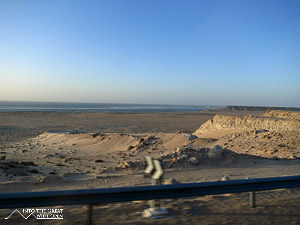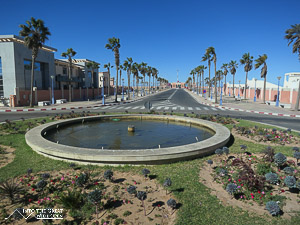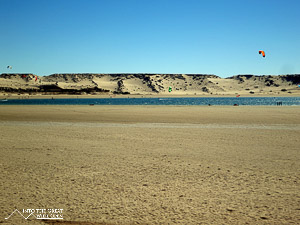Dakhla, Western Sahara
The Other Side of No Man's Land
December 31, 2012
Some days are diamonds, some days are rocks
Some doors are open, some roads are blocked
Sundowns are golden, then fade away
But if I never do nothing
I'll get you back some day
- Tom Petty

Leaving Nouadhibou wasn’t exactly as easy as getting there. There wasn’t any public transportation to the border so I had to pay a driver to take me there. The people at my place to stay helped me find the driver and he seemed to know most everyone in town. We were stopped at the checkpoint at the entrance to the city, where the last driver had closed the curtains of the van to hide me. The driver told me to stay in the car and he got out to talk with all the police and military there. He moved back and forth between different offices and I saw a few handshakes where money was transferred to the head officials. Now I knew what the other driver wanted to avoid.
Even the border between Mauritania and Morocco/Western Sahara was strange. Past the Mauritanian checkpoint there are a few kilometers of No Man’s Land, allegedly ringed by active minefields, a remnant of the unresolved conflict. In this area there are numerous abandoned and partially destroyed cars, broken TVs, and other random items; the type of things that made you wonder about the story behind their presence. Despite the presence of mines the road was not well marked or even maintained in any way. It was rough and rocky and slow to traverse. Nor was it busy, we passed only two other vehicles making the crossing. At the other side the Moroccan flag flapped in the desert wind.

Despite its disputed status, Morocco administers this land as if it were its own, although with a much greater police and military presence. I made it through Moroccan immigration just in time to catch the only daily bus from the border to Dakhla through 400 kilometers of rocky desert. It’s a good thing I made the bus as the border town consisted of 1 gas station, 1 restaurant, 1 store, and 1 hotel.
There wasn’t much to see along the way. In most places the ocean was visible in the distance but the shoreline was blocked by steep cliffs. There was only one town along the way with nothing interesting to see. The bleak road was only broken up by 5 police checkpoints. At each one my passport was inspected and my data recorded along with the six character alphanumeric number that was written above my entry stamp. I assumed this was some type of foreigner tracking number. I was also asked where I was going and what my profession was. I’m not sure why my profession was relevant because I doubt anyone would say something like refugee activist or Sahrawi freedom fighter, which would likely raise concerns.

The police and military presence is one indication of the unresolved conflict. Since Spain abandoned the region in 1975 Morocco has claimed the territory. This has been at the expense of the local Sahrawi people who, after a UN brokered cease fire in 1991, were told they would have a chance at independence which has yet to come about. Morocco has been building infrastructure and bringing money and people to the area in efforts to integrate the region with the rest of the country. This integration seems to be aimed at assimilating the territory so as to claim it and make it harder to separate. However, no other UN members recognize Morocco’s claim on the territory. Like every other occupied territory I have visited, the police and military keep a close watch on people and make their presence known.
Despite this, Dakhla seems to be a peaceful place. Like Nouadhibou it is isolated on a peninsula jutting off the mainland about 30 kilometers. This peninsula creates a large lagoon which, along with the persistent wind, caters to windsurfers and kite surfers who occupy camps on the approach road into the city. The city itself is a mix of new developments with a large broad central avenue and spacious ocean front promenade. At night the streets are busy with people and makeshift markets are set up in the center. It is nice enough but lacks the feeling of any kind of character or genuine personality. Maybe that will come over time. While new buildings and infrastructure can be easily built, Dakhla’s character will be slow to develop due to its isolation. Perhaps someday it will be more than just a desert outpost on the way to or from Mauritania.














































